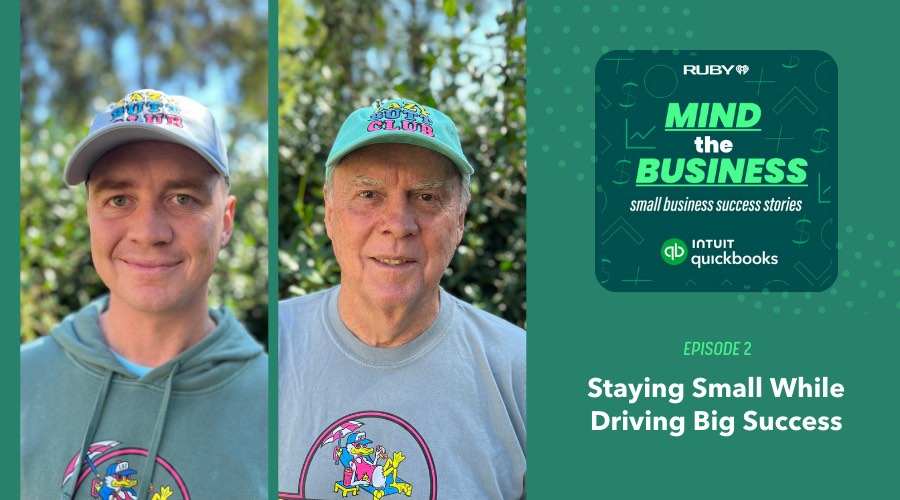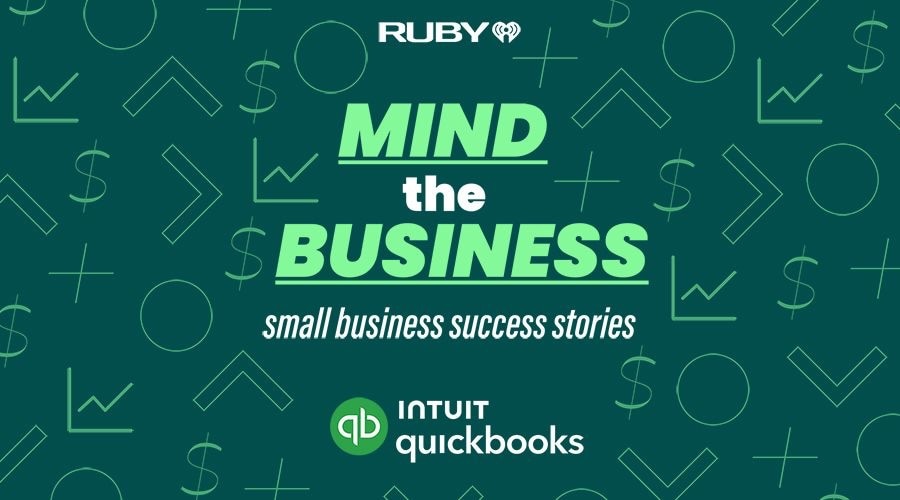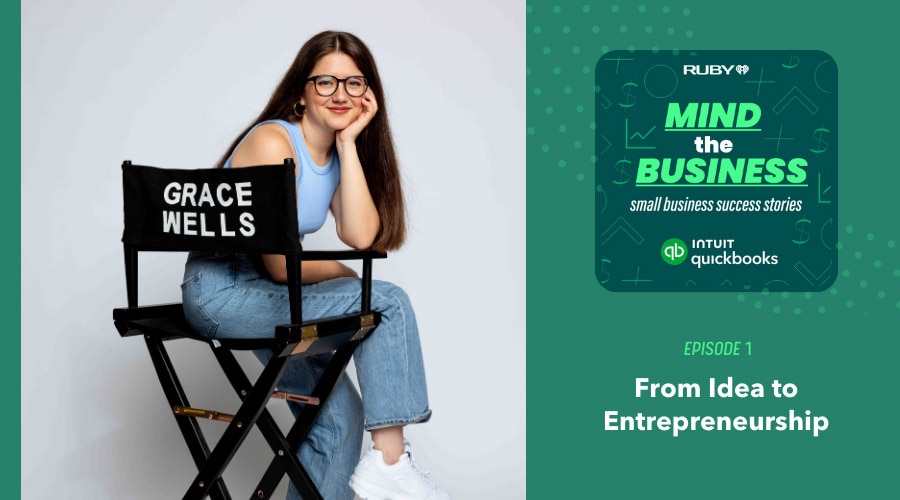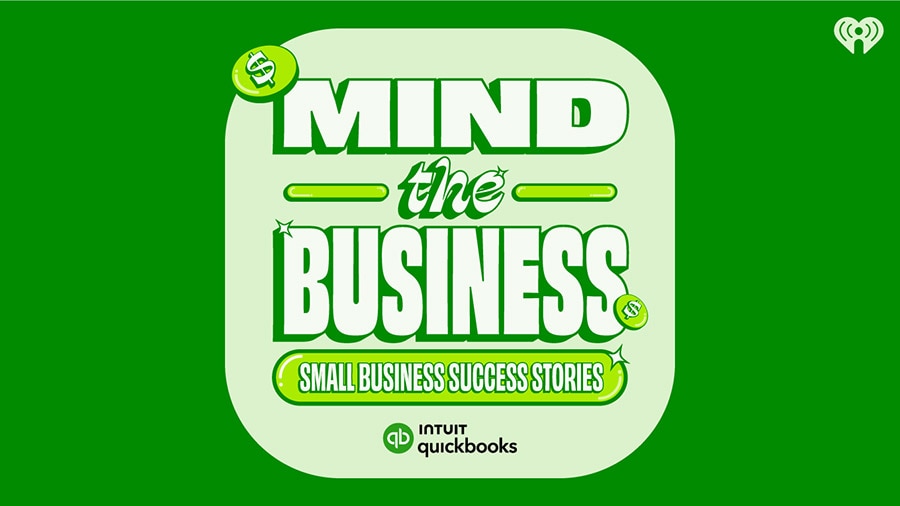Owning a small business can be one of the most rewarding and challenging things a person does. Amid an uncertain economy and ever-evolving consumer trends, there is a lot to figure out and navigate to ensure your business thrives. Join hosts Jannese Torres (Yo Quiero Dinero) and Austin Hankwitz (Rate of Return) as they connect with small business owners and hear their stories about managing the ups and downs of starting and growing a small business. Listen and learn valuable lessons from their experiences that will guide you along the way through your own small business journey.

Staying small while driving big success
Embracing laziness as a good thing is the ethos of the founders of Lazy Butt Club Clothing Company. But when it comes to business, the owners of Lazy Butt Club — an apparel company that specializes in cozy staples, loungewear, and more — are anything but lazy.
Father and son Michael and Daniel Jay found success selling shirts and other products online with the help of the popularity of their family-focused videos on TikTok.
Austin Hankwitz: Welcome to the show, Michael and Daniel.
Daniel Jay: Thank you. Hi, thanks for having us.
AH: Absolutely. So, I love the name, Lazy Butt Club, but how the heck did you come up with it?
Michael Jay: Back in the 80s, there were a lot of clubs. Club med, club this, club that — a lot of designs and t-shirt shops were vacation club, And I was selling t-shirt transfers to t-shirt shops all around the country. And so I just kind of picked up on the coinage of “club.” I did yacht club, beach club, vacation club… I had quite a few.
Daniel: You had made the duck logo without putting “Lazy Butt Club” under it, and then you thought the duck looked lazy, so…
Michael: Yeah, I called him a beach consultant.
AH: So Daniel, you've resurrected this great brand your father created decades ago. When did you realize that these fun designs would have such a large demand?
Daniel: We found the original iron-on transfers that Dad had stored away. My brother and I wore the shirts around for about a year. And very quickly it became the most complimented and commented-on shirt that I had ever owned. Everywhere we went, be it the grocery store checkout or just at a coffee shop or anywhere, even at the gas station, someone from the car over was like, “Hey, I love your shirt!"
So we realized that it was kind of a special design and something that resonated with a lot of people. It's just really playful and kind of fun to wear. And so after that happened so many times we thought maybe we could start it as a brand and build off of that. We decided that we definitely had something special and that we should just go for it.
AH: Michael, what did you think when you found your children wearing and now eventually selling your old shirt designs? Were you a little skeptical? Like, wait a second. This was a thing back in the eighties. Why are people excited about it now?
Michael: Well, they've been wearing them for so long now that I kind of forgot about what it was like in the beginning. But I had sold it to so many stores, t-shirt shops and stuff around the country over the years and had real success with it then. But for them to bring it back and get the results that we've had, it's pretty amazing.
AH: Oh, absolutely. I mean, who doesn't like a cool design of a Tyrannosaurus Rex wrecking on a ski slope, right?
Jannese Torres: You guys have gone from selling one t-shirt a week to hundreds a day. How fast did that growth actually happen? And were you surprised by how quickly things grew?
@lazy_butt_club This is our lazy butt family. #family #fyp #wheredallthetimego #familybusiness ♬ Where'd All the Time Go? - Dr. Dog
Daniel: We’re definitely surprised. The first year we started we sold about 50 and then 93 in the second year and then in the third year — that was the year we went viral. March of 2021. That year we sold over 6,000 orders, probably like close to 10,000 shirts.
After that first video, we sold 500 orders overnight. The previous month, we probably made like five orders in the whole month. So it went from five to 500 overnight. And then, as far as being ready for it, we weren't technically ready for it at all. We were basically made to order. It took about three weeks to fill all those orders, so people were waiting for a little while. But everybody was happy to support, nobody was upset at all.
JT: Did you communicate that with your customers, that there would be a lead time? How did you handle that increase in demand?
Daniel: Once we realized how behind we were on the orders, I posted another video, and the follow-up videos were all about how we're crazy overwhelmed, and like, grateful for everything. And so people were more than happy to wait. I mean, a lot of the comments were like, “Take your time. Don't work too hard.” So it was nice that everybody was so supportive and just happy to help us out. And on TikTok, they love to see you grow like that. And they love to see a small company blow up.
JT: Michael, how have you managed to keep the team small with this large increase in size? Has there been sort of a strategic thought process around, you know, let's keep it lean and mean? Or is growth one of those things that y'all are talking about as time goes on?
Michael: Over the years that I've had the t-shirt shops and different things like that, it was always just trying to keep something going and making new designs and just continuing. And then I realized I could make more money than minimum wage selling a few shirts. That's the incentive more than anything. Just being a business owner. And as far as getting big, at one point I had about 15 different employees with my t-shirt shops, but you can grow and have to work harder and make more orders to keep the thing going. But since the name of our business is the Lazy Butts Club, we're kind of leaning more towards keeping between the three of us and making it easy.
There are a lot of things we could do to really get bigger. If we get big, that's fine. I'm sure we can handle it. So we'll just take it one day at a time.
JT: You know, I think that's something that not enough entrepreneurs are honest with themselves about is like, how much do I want to grow this? Like, when is enough enough? I think a lot of us are kind of programmed, especially with social media, to always scale, always grow, always get bigger, do it as quickly as possible. And maybe for some of us, that's just not the path to success.
@lazy_butt_club Unbelievable summer! Probably our last big trip to the post office, we’re finally caught up! Time to get more designs ready to release and get more products! Thank you all so much! #smallbusiness #retro #dadsoftiktok ♬ original sound - LAZY BUTT CLUB
JT: Michael, how have you managed to keep the team small with this large increase in size? Has there been sort of a strategic thought process around, you know, let's keep it lean and mean? Or is growth one of those things that y'all are talking about as time goes on?
Michael: Over the years that I've had the t-shirt shops and different things like that, it was always just trying to keep something going and making new designs and just continuing. And then I realized I could make more money than minimum wage selling a few shirts. That's the incentive more than anything. Just being a business owner. And as far as getting big, at one point I had about 15 different employees with my t-shirt shops, but you can grow and have to work harder and make more orders to keep the thing going. But since the name of our business is the Lazy Butts Club, we're kind of leaning more towards keeping between the three of us and making it easy.
There are a lot of things we could do to really get bigger. If we get big, that's fine. I'm sure we can handle it. So we'll just take it one day at a time.
JT: You know, I think that's something that not enough entrepreneurs are honest with themselves about is like, how much do I want to grow this? Like, when is enough enough? I think a lot of us are kind of programmed, especially with social media, to always scale, always grow, always get bigger, do it as quickly as possible. And maybe for some of us, that's just not the path to success.
AH: So I discovered you all on TikTok. You guys are crushing it on TikTok Shop. How do you think that your family-focused videos have affected the demand for your brand?
Daniel: I honestly wasn't posting all that much in the first couple of years, I was just trying to grow the idea of the brand. And I believe that the design and the idea stands on its own. Once I posted the video of Dad telling the story — it was just one 24-second clip of Dad pressing the design and then pulling off the paper and revealing the design. And I said “My dad and I are trying to make a brand out of designs he made in the 80s. He works hard but loves when he has time to be lazy. If you drop a follow, it would mean the world to us.”
And so they were hooked with the story, and then at the very end, they got to see the design. So after that, I realized that it kind of was all about the story to gain that emotional connection with the audience and just being honest. And that's what social media offers. The ability to be honest and authentic. That's what people resonate with the most.
AH: Absolutely. I couldn't agree more with you here. And it's kind of a challenge to post that first video. You kind of feel like, Oh my gosh, what if people are going to judge me? What if they don't like my products or service or whatever I'm offering here as a solopreneur? Do you have any advice to encourage someone listening right now who maybe hasn't thought about TikTok Shop or Instagram or just social media in general for their products and services?
@lazy_butt_club So many kind words from you all we really appreciate it ❤️🙏 #smallbiz #retro #dadsoftiktok #90sthrowback #80s ♬ original sound - LAZY BUTT CLUB
Michael: I might say that, like…when Danny first started doing the videos, he was a little concerned about making the perfect video. And I said, you know, I see all these videos on TikTok and some of them aren't really good, but people watch them. And if you make videos that aren’t good, then they'll swipe, so who cares? The main thing is just getting the video out there. And most people that are watching TikTok videos, they're not doing it to be a critic of what you're doing. They want to hear some words out of your mouth and that's it. It's really pretty neat.
JT: I love that. So essentially, you're taking on another role now as sort of a production company with All the marketing and advertising work that you're doing by creating these videos. So, how do you find time to continue the output of videos while keeping this lean footprint?
Daniel: It is kind of a lot to think about. Like, while we're in the middle of production, I'll be like, “Oh, I need a video. I need a clip of this.” When it's while I'm doing a hundred other things. So, you just have to take out the camera and film a couple day-in-the-life kind of things.
And people like to see that kind of stuff. We could plan for more of our videos, but right now, we're just kind of doing it as we go. It's exactly what we're doing that day, or I'll use a clip from a few months ago, and I'll put some words over it. One of the clips I made that went viral, it was 13 different clips, and those clips were from all over. But it is a lot and you have to constantly be thinking about it. But it's what we want to do. And it's actually fun to share our story.
@lazy_butt_club Me too actually 🥲 #smallbusiness #retro #dadsoftiktok ♬ brazil - daizy🌷
JT: Yeah. I think that's why people are resonating with it because not only are you sharing the behind the scenes, and the story of what the brand represents, but you're also just giving a real-life glimpse into what it looks like on a day-to-day basis, whether that's, you know, making shirts or packing out orders. And I think that's the part that makes people feel really connected when they see you growing. Because they feel like they've been part of the journey alongside you. Do you think that part of the advantage that you've seen is the fact that you are a family-owned business? Like, have you gotten feedback from your audience that that's something that they're connecting with?
Daniel: It definitely helps being a family business because so many people relate to it. You know, people comment “I love that you get to work with your dad. It's so cool. Your dad reminds me of mine,” or whatever — stuff like that. Like it's definitely an added thing. It's not just two people working together. It's family. It's cool.
Michael: It kind of makes it sound authentic. It's like, “Oh, it's a legit business because it's a family business.” It works out pretty good. It’s a nice story. When we go to the street fairs and stuff, we get a lot of people that recognize us.
And one thing that I've kind of leaned towards is — well, Danny, when he makes videos, most of those are of me. So when I see people, I'll tell them if you're not on TikTok, or if you're on TikTok, get an old person in your video! That old person — whether it be your parent or whoever — they're part of your story, you know, and just make them part of your story and see what happens.
JT: I absolutely love that you're breaking the stigma that folks in older generations don't embrace technology and the new way that things happen. So I think it's great to embrace the technology and tell folks how powerful it's been to grow your business.
AH: At the end of the day, people follow people, they don't follow brands, right? So people see you two creating these t-shirts, spending time together, enjoying yourselves, running your business, and they want to follow your journey.
I'm sure they will love the Lazy Butt Club as much as I do, but they want to follow Michael and Daniel, right? And I think there's something really powerful to be said about that. Michael, you've been in this t-shirt game for a very long time. Was it weird to start selling things other than t-shirts like sweatpants and hoodies and caps and stickers, or did it come naturally?
Michael: I would say it basically became natural. Because I mean, I've always sold sweatshirts and T-shirts and everything. And with TikTok, we've been able to get out to more people. It just seems like the next step is to offer them more stuff and people enjoy it. You know, it's just, it's kind of neat to think that there are lazy butts all over the world that want to buy it. We've shipped to 24 different countries.
AH: So when you started introducing these new product offerings, did you have to change your day-to-day work streams? Was there any new technology you had to use to try and track different shipments from different suppliers?
Michael: This day and age you can ship something and get it the next day. You don't really have to keep a huge inventory. And so to add an extra product It's not that big of a deal. Order the shirts, get them the next day, print them, and ship them out.
AH: Do you have any tips or tricks for people who are trying to find their next good supplier or build that relationship with a supplier? Any questions to ask or any pieces of information to verify?
Michael: Basically, the best advice would be to try to talk to the owner or vice president — somebody that's pretty much in charge of the company. And if you feel a connection with them, go with them. If it costs 10 cents more, 50 cents more, whatever. It's not that big a deal because just like building trust with the brand, you build trust with the people you're buying from.
@lazy_butt_club Purrfect.. on sweatshirts and tees #lazy #cat #catsoftiktok ♬ Yasashi - CXSPER
AH: Now the question is, do the founders and CEOs of Lazy Butt Club ever find time to be lazy themselves?
Daniel: Dad wasn't lazy at all in the first 30 years of business. I mean, Dad has told me he's been working, I mean, there were times you were working, what, 70 hours plus a week?
Michael: 70, 80, whatever you have to do.
Daniel: Yeah, but like, were you lazy? Did you get any time to be lazy then? Probably more now.
Michael: I think I found time.
Daniel: I have plenty of lazy hobbies. I play guitar, which I think is kind of lazy, and I play a lot of video games. I think we could be bigger, maybe, if I wasn't truly a lazy butt. But the way we're growing now is at a good pace. And I think, you know, I'll start working 70 hours a week like Dad did when he was my age… maybe eventually.
Michael: At least for one week.
This podcast is a production of iHeartRadio and Intuit QuickBooks. Our executive producer is Malia Sosha, our supervising producer is Nakia Swinton, and our writer is Eric LiJia. Our head of post production is James Foster. QuickBooks Money is a stand alone Intuit offering. Banking services provided by Green Dot Bank, member FDIC. Only funds in envelopes earn annual percentage yield. APY can change at any time. Money movement services provided by Intuit Payments, Inc., licensed as a money transmitter by the New York State Department of Financial Services.











